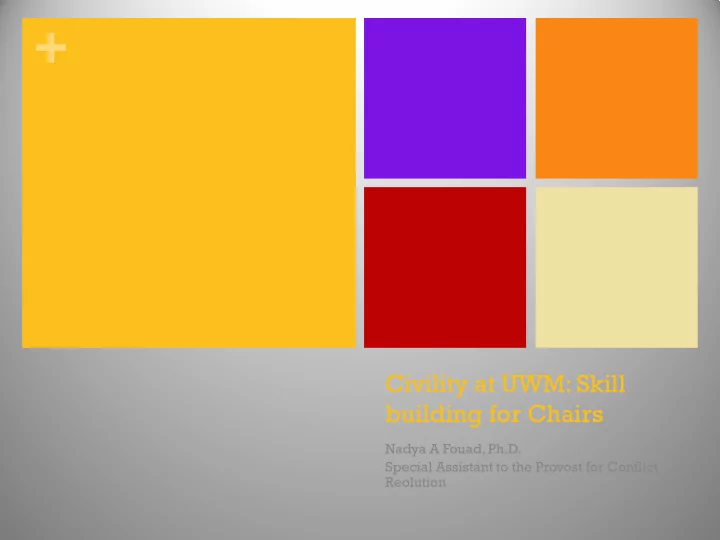

+ Civility at UWM: Skill building for Chairs Nadya A Fouad, Ph.D. Special Assistant to the Provost for Conflict Reolution
+ Agenda Overview of Ombuds Council/conflict resolution Civility-a definition UWM Code of Conduct Incivility—examples Violations: Implications for Exec Committees Scenarios: Implications for Chairs Tools
+ Ombuds Council 10 Volunteers Impartial Confidential Independent Neutral http://uwm.edu/ombudsman/
+ Civility Treated with respect and dignity Environment free from insulting, humiliating or degrading behavior or language
+ UWM Code of Conduct Integrity by maintaining an ongoing dedication to honesty and personal responsibility; Trustworthiness by acting in a reliable and dependable manner; Equity by treating others with fairness and impartiality; Respect by treating others with civility and decency, not engaging in bullying, intentional physical harm or intimidation.
+ UWM Code of Conduct Stewardship by exercising custodial responsibility for University property and resources; Compliance by following State and Federal laws and regulations, University policies and contractual obligations related to their duties and responsibilities;
+ UWM Code of Conduct Confidentiality by protecting the integrity and security of university information such as student records, employee files, patient records, and contract negotiation documents. Personal Responsibility by complying with the UWM Behavioral Standards and Expectations and the UWM Respectful Campus Standards.
+ Uncivil behaviors Rude, demeaning and neglecting behavior Failure to return telephone calls or email messages Giving someone the silent treatment Failure to respond positively when someone needs support Giving someone a “dirty look” Asking for input and then ignoring it
+ Uncivil behaviors Failure to give credit for collaborative efforts Speaking with a condescending tone Interrupting others Refusing to listen Impatient behaviors “Side-bar” conversations during a formal meeting
+ Uncivil behaviors Sending a nasty, debasing email or note Talking about someone behind their back Psychological put-downs Discriminatory behaviors based on race, gender, religion, and so on Accusations about professional competence Overruling decisions without valid cause
+ Uncivil behaviors Disrupting meetings Giving public reprimands Aggressive, belligerent or violent verbal exchanges with students or coworkers Intentional creation of inequities—injustice for students or coworkers
+ But…. The interpretation of what is civil and what is uncivil is in the perception of the receiver, not the sender (Barash, 2004)
+ Violations of Code of Conduct Any alleged violations of this policy should first be reported to the employee’s direct supervisor, department chair or department head as appropriate. It is expected that the recipient of the information regarding the alleged policy violation will investigate and take appropriate action.
+ What can chairs do? Earlier discussions are better
+ What can chairs do? Do not ignore harassing and bullying behavior. There are (at least) two sides to every story; try to refrain from making a judgment until you have gotten information from a variety of sources.
+ What can chairs do? Access campus resources to help guide decision-making. –call us! Do not promise things you cannot deliver; recognize limits of confidentiality. Maintain communication with all parties
+ Curtailing incivility Operate from mission & values. Clarify expectations and consequences Listen. Follow policy.
+ Curtailing incivility Evaluate yourself and your perceptions. Am I partly to blame? Be careful about “marginalizing”. Take appropriate actions– act
Recommend
More recommend